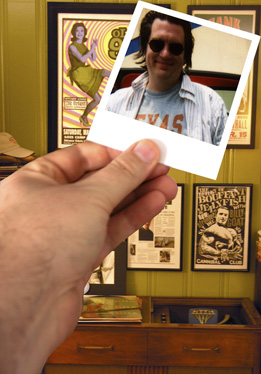Just finished Texas Literary Outlaws by Steven L. Davis, a look at how a small group of writers transformed Texas literature and the state’s vision of itself.
The nucleus of this group, I’m proud to say, enjoyed its formative years in Fort Worth. Dan Jenkins, Bud Shrake and Gary Cartwright all came of age in the sports department of the old Fort Worth Press under the tutelage of legendary sportswriter Blackie Sherrod. As an old Fort Worth sportsguy myself, I know their presence was still a powerful one even in the 1990s when I was there.
Although they are probably better know for their gonzo antics fueled by booze and pills, these guys were serious about the words. Sherrod could be a stern taskmaster gave them a strong foundation on which to build their writing. His mantra was this: hook’em with a strong lead, adopt a distinct point of view and hammer it home with a strong angle. That was the Fort Worth School of journalism.
Sherrod was an old-school, disciplined, hard-ass sports editor. But he also valued the craft of writing. He insisted that his reporter read and discuss literary journalists like Damon Runyon and Mark Twain. They dissected each other’s writing.
Sherrod believed that the games themselves were only of marginal importance. Years later, he wrote in his Dallas Morning News column that he didn’t believe that quarterbacks and shortstops were real heroes – real heroes were guys who could land a torpedo bomber on the pitching deck of a aircraft carrier. His experiences in World War II gave him a perspective – and perhaps a cynicism – that was a valuable component in his work and once that he passed on to those he worked with.
His writers learned that lesson well and throughout their careers, Jenkins, Shrake and Cartwright used sports as a departure point to discuss topics that were of far more interest to them. That’s a lot different than the attitudes of sportswriters today. ESPN has poisoned the minds of a generation of sports journalists. Today, everyone wants to be a personality – it’s all about the pose and the blather. The Sportscenterization of America has mangled the craft of sportswriting. No one cares about the words anymore, all they care about is their closeup.
One ugly truth that these guys dealt with then that hasn’t changed today is the current of anti-intellectualism and conservatism for which Texas is unfortunately famous. This book really helped me place these attitudes on a continuum and see how some things really don’t change that much. There have always been Rick Perrys.
Like their friends and colleagues Larry L. King and Billie Lee Brammer, their exploration of social, racial, sexual, musical, existential and pharmaceutical issues went against the grain. Spiritually, they had more in common with the Beat Generation than they did their peers in the newsrooms where they worked. They even coined a name for their spiritual fellow travelers – Mad Dogs, Inc. “Doing Indefinable Service to Mankind” was their tagline and their universe included Willie Nelson, Jerry Jeff Walker, and Ann Richards.
The Mad Dogs were aware that something was different in postwar America and they were desperate to define it and discuss it. Objectivity didn’t exist; they put themselves in their stories. They may have tried to stay aloof, but they were there. They were involved.
But this journey often led them away from Texas. However, even when they left Texas, Texas didn’t leave them. They came back to these themes and topics throughout their careers.
Brammer’s novel The Gay Place is hailed as “Texas’ first urban novel” and while that is certainly true, it’s also a powerful exploration of not-so-young people grappling with mortality, lost love and broken dreams. It’s a work about existential dread as much as it is about politics and Brammer describes that ennui better than anyone else I’ve read recently.
The same could be said for another peripheral character in this book, another Fort Worth resident named Jay Milner. His memoir, Confessions of a Mad Dog, hits on all of these same topics and is a valuable supplement to Davis’ work.
I’m heartened by the perseverance of these guys as writers. Even when it didn’t seem that anyone wanted to read their work, they kept after it – they might have made good bloggers. It wasn’t easy making ends meet with families to feed and day jobs to hold down, but they still managed to make time for their work. And lots of drugs, alcohol and misbehavior which didn’t make family, work and writing any easier, but it sure seemed like fun anyway. Their search for meaning and purpose wasn’t an easy one either.
How will history judge these guys is the last question this book asks. When their work is separated from their personality, will it endure? That answer seems to be yes for now, if only because they were such keen social observers and chroniclers who record that moment when Texas really changed.
Saturday, February 11, 2006
Doing Indefinable Service to Mankind
Posted by
Steve-O
at
12:10 PM
![]()
Labels: books, Fort Worth
Subscribe to:
Post Comments (Atom)

No comments:
Post a Comment